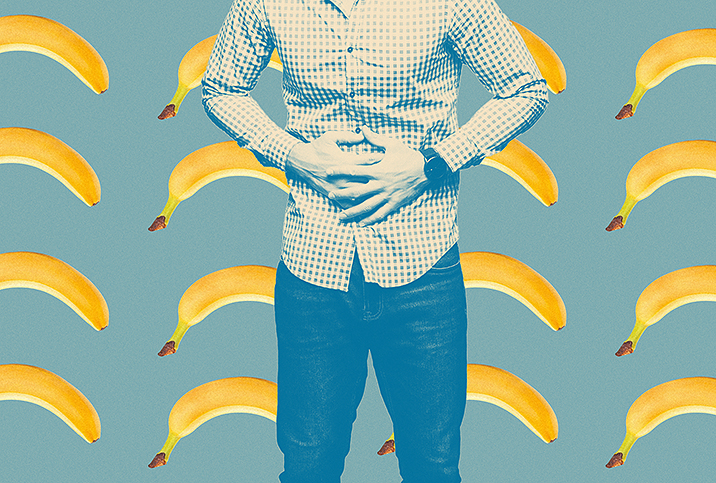Navigating the FODMAP Diet

If you're like me, you suffer from periodic or constant bowel disturbances, which can include bloating, pain and alternating bouts of constipation and diarrhea. For women, menstrual cycles may make things worse.
In seeking out solutions for symptoms, your gastroenterologist may recommend the FODMAP diet. And, though popular, FODMAP's widespread use has led to major misconceptions about how to best deploy this elimination diet in order to manage chronic conditions such as irritable bowel syndrome (IBS), endometriosis and other chronic conditions.
FODMAP explained
FODMAP is an acronym for the most common intestinal irritants that can exacerbate chronic conditions and irritate the gastrointestinal system, each of which is a short-chain carbohydrate—fermentable oligosaccharides, disaccharides, monosaccharides and polyols. These cause the most impactful symptoms, such as bloating, pain, abdominal distension, constipation and diarrhea.
Within each carbohydrate category, there are high and low FODMAP foods. The initial goal of the diet is to eliminate all foods in the "high" category, and then slowly reintroduce specific foods to determine which trigger symptoms. The elimination process is temporary.
Getting started
"Trying to avoid sugary and high-fat foods is important," said Lynn B. Panton, Ph.D., an exercise physiologist with Florida State University. "Fruits and vegetables are important. Protein is great to help with maintaining muscle mass and bone density…[as are] good fats like your olive oils and avocados."
The idea of eating foods that make you feel better seems obvious, but because the goal is to improve your physical and nutritional health, tailoring a diet like FODMAP to your unique needs is an essential first step.
A dietitian can help
To better understand this balance, Monika Bettney, a specialist gastroenterologist, women's health dietitian and consultant with the IBS Network, helped sift through the misconceptions of FODMAP and gastrointestinal conditions.
When you first receive a diagnosis, Bettney recommends journaling, but to avoid sustaining it for the long-term because the more you journal, the more you can trigger visceral sensitivity. Visceral sensitivity occurs when stress induces hormonal changes that negatively impact digestion. The gut microbiome then feeds nerve impulses back to the brain that trigger mental health symptoms such as anxiety and depression and can further compound gut symptoms.
"Most doctors don't know what to do with the diagnosis," Bettney said. "They simply refer the patient to a dietitian or, worse, they send the patient home with a sheet of paper saying, 'Do this diet,' which is actually more unhelpful than doing nothing at all."
Bettney said patients should consider spending time with a dietitian who can help them to map their daily food consumption, identify foods that may cause inflammatory symptoms such as bloating, constipation and diarrhea, and help the patient structure a custom plan to manage their symptoms.
A lack of this counseling is what brings most patients to Bettney's office.
This is not a cure
FODMAP isn't a cure, but rather a process to help minimize discomfort. However, most patients get stuck in the elimination phase because they finally feel better and when they try to add foods back to their diet, they don't know where to begin.
To properly navigate the FODMAP diet, slowly reintroduce foods, one at a time, every few weeks to test what your body can tolerate. When testing each food, documentation is important. When a food creates irritation, this food should be eliminated and the gut be given time to calm before a new food is tested.
For example, gluten is in the high-FODMAP category, so after eliminating it for two weeks, you'd then reintroduce it into your diet for a period of two weeks and chart your symptoms. You should then go back to a week of avoiding gluten before reintroducing another high-FODMAP item. Over a span of a few months, you will identify the foods that trigger symptoms and eventually learn what to eat and what not to eat.
Before you start the process, understand this is time-consuming work. A dietitian can help you narrow down your list much faster and learn the value of balancing the quantity and type of food. For example, you may find you are sensitive to gluten in large quantities, so if you decide to have a sandwich at lunch, maybe skip the dinner roll in the evening to avoid triggering a flare-up.
Your gut is in constant flux
Another important factor when navigating FODMAP is that your digestive system won't be the same forever. The reality is, no matter how much we monitor our food intake and better understand the effects of our medications, the stress of our lives can cause IBS flares, and it's important to factor these events into managing symptoms.
So, if you think this is all about your gut, don't be surprised when so many gastroenterologists end up asking a lot of questions about your mental state.
"We don't know what comes first—the depression or the gut symptoms," Bettney said. "But we do know from looking at the gut-brain axis that it tends to be a two-way street. Being depressed or anxious is more likely to negatively impact our bowel functioning, which then has a negative impact on the kind of hormones and neurotransmitters that impact our anxiety levels, so it seems like people with IBS are more likely to struggle with depression and anxiety."
Without fully understanding this connection, it may feel like our doctors are implying this is all in our heads. However, our mental health and IBS work together in a constantly fluctuating cycle. This can, unfortunately, leave us feeling helpless because sometimes a flare-up is unavoidable.
Before making any changes to your diet, make sure you discuss that decision with your primary care physician and ask for their advice and suggestions.


















